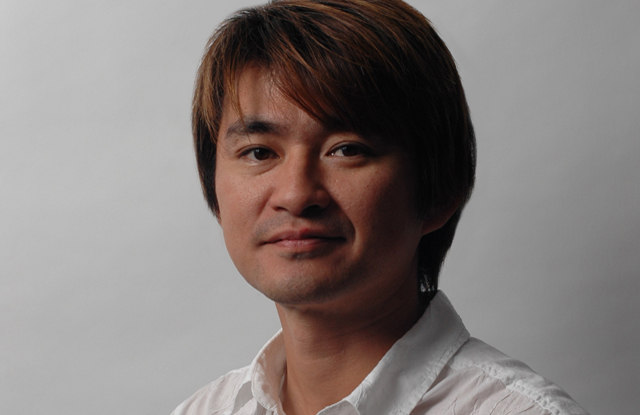Game Masters: Tetsuya Mizuguchi
Our interview with the creative mind behind Rez, Lumines, and Child of Eden.
This interview is part of GameSpot's Game Masters: Behind the Talent feature, which explores some of the biggest names in game development. The feature coincides with a new exhibition celebrating video game culture taking place at the Australian Centre for Moving Image (ACMI) in Melbourne, Victoria.
The exhibition showcases the work of celebrated game designers from Australia and overseas through a combination of concept art, interviews, and more than 125 playable games from the arcade era through to new releases.
"There will be a move away from DLC."--Tetsuya Mizuguchi.
Our next featured Game Masters developer is the man behind some of the creative interactive sound design titles in the industry, including Lumines, Rez, and Child of Eden.
Mizuguchi began his industry career at Sega as a producer on the Japanese publisher's arcade machines team, helping build games like Sega Rally Championship (1995) and Sega Rally 2 (1998). However, his best known work came later as head of Sega's United Game Artists division, the team responsible for the Space Channel 5 (1999) and Rez (2001).
In 2003, Mizuguchi and other ex-Sega developers founded Q Entertainment where the Japanese designer created the classic puzzler Lumines (2004), and collaborated with Phantagram developer Sang Youn Lee for Ninety-Nine Nights (2006) on the Xbox 360, and oversaw adaptations of the Every Extend (2006) and Gunpey series (2006).
In 2011, Mizuguchi released Child of Eden, the spiritual successor to Rez that combined on-rails shooting with rhythm action elements.
Check out our interview with Tetsuya Mizuguchi after a few words from the man himself:
Sclash - Console Release Date Trailer Kingdom Come: Deliverance 2 - Official Cinematic Announcement Trailer Stellar Blade - BIBI ‘Eve’ Official Music Video Trailer | PS5 Apex Legends: Urban Assault Collection Event Trailer Total War: WARHAMMER III - Elspeth von Draken Gameplay Showcase Genshin Impact - "Arlecchino: Sleep in Peace" | Official Character Teaser Potionomics: Masterwork Edition - Official Announcement Trailer Snowbreak: Containment Zone - "Gradient of Souls" Version Trailer Harold Halibut GameSpot Video Review Nancy Drew: Mystery of the Seven Keys | World Premiere Official Trailer Modern Warfare III & Warzone - Official Cheech & Chong Bundle Gameplay Trailer SteamWorld Heist II – Official Reveal Gameplay Trailer
Please enter your date of birth to view this video
By clicking 'enter', you agree to GameSpot's
Terms of Use and Privacy Policy
What's exciting you about the game industry right now?
It's a tough one. Firstly, cloud technology is exciting. We play games on hardware platforms now, but this is slowly changing. Platforms are changing to the cloud. This means we will soon have a new business model, and a new play style.
Looking back, what particular moments in gaming's history have made an impact on you?
When I began in the games industry in the early '90s at Sega, I witnessed the birth of 3D graphic technology. That invention was an exciting moment.
At the moment what's making an impact is all this talk of the future. Many game designers and creators--including me--talk big about the future. But we are impatient. We have to wait.
Of course, the happiest thing is that imagination never seems to change. I think my imagination from many years ago compared to now is almost the same. And that's a great thing. It means the game industry can base itself on this energy and grow. Imagination plus technology: that's what's really exciting at the moment.
What was the most valuable thing you learnt during your time at Sega?
Working on Rez. At the time, when I told Sega about my idea, nobody really understood. It was a very new idea. But I had the passion, and I took the time--almost three and a half years--to build the team and connect with the idea. At times I couldn't see the top of the mountain, but keeping the willingness to experiment and never losing passion helped us get there in the end and helped us create a new game form.
What draws you to music and sound design in your games?
Well, everybody has rhythm, be it good or bad. Everybody likes and understands music. If you think of rhythm, you associate it with feeling good. It's an organic thing. In my games I want to create a new experience that recreates this feeling. Rhythm and music is a big part of everybody, it's the value of language and culture. It's a deep and invisible thing, but it's very important.
How do you think the Japanese game development industry has evolved? Where is it headed?
It's really difficult to say. The Japanese market is changing drastically: there are many social games, many mobile phone games. These are small games, but the fact they exist is great. Many people find enjoyment in just ten or fifteen minutes of gaming--and this is just the beginning.
I think it's the season of creatives in the Japanese gaming industry. I see an exciting future coming maybe three years from now. Some of the industry is experience a period of chaos right now, but I see it getting better, more exciting.
What about the wider games industry?
In the wider industry, it's hard to say what's in store. I think we'll move away from DLC, packaged content, and downloadable titles. It will all be about playing the in the cloud. We'll also see more innovation with game styles…it will be anything goes!
To find out more about GameSpot's Game Masters feature, visit the home page.
Read our Game Masters interviews with Tim Schafer, Warren Spector, and Peter Molyneux.
'Got a news tip or want to contact us directly? Email news@gamespot.com

Join the conversation